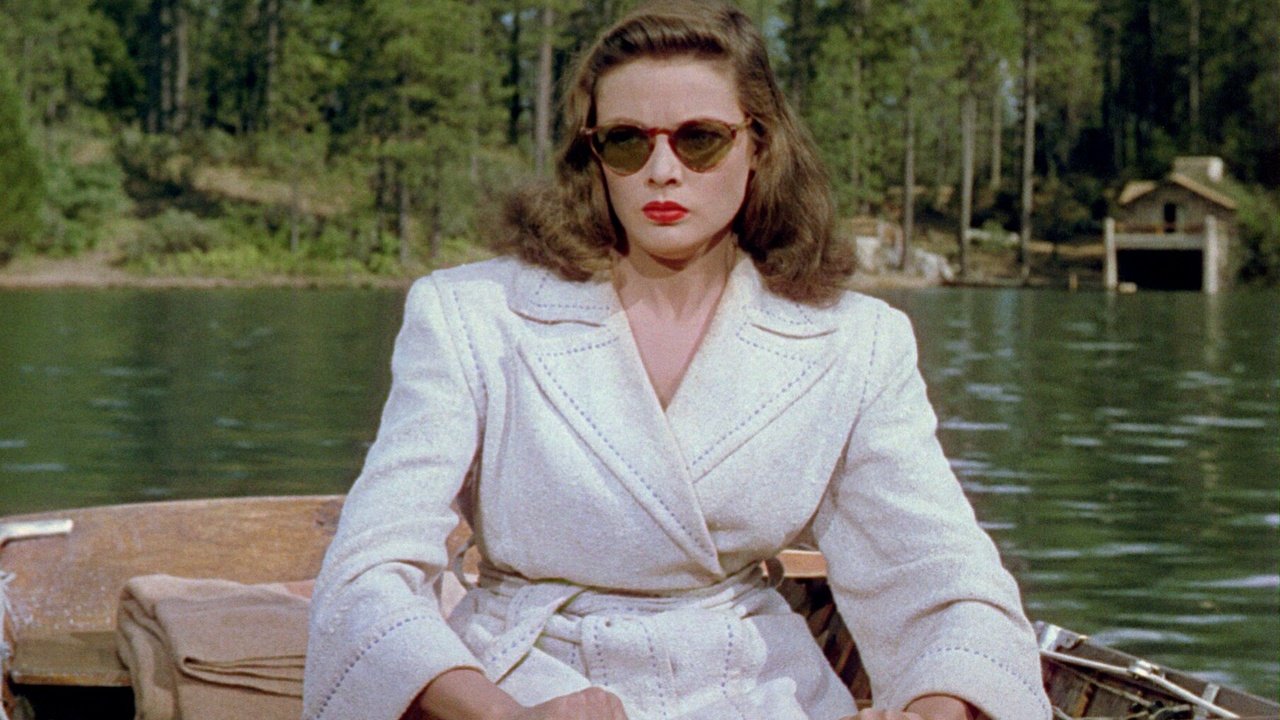Review: Leave Her to Heaven (1945)
John M. Stahl’s Leave Her to Heaven plays like a 1940s version of Gone Girl. Perhaps I’m overstating things here, but it’s the closest comparison I can summon in contemporary cinema that helps us understand this film’s relationship to its terrifically beguiling heroine, Ellen Berent, played by Gene Tierney in her most iconic role. Ellen is a beautiful, rich, blonde socialite from the East Coast who manipulates the men in her life in order to satisfy her all-consuming ego. She is icy and cunning and far smarter than her handsome writer husband, Richard Harland (Cornel Wilde), and goes to deadly lengths to get what she thinks she deserves, including her husband’s affection. Does this sound like Rosamund Pike’s Amy Dunne to you? I admit, it’s not a perfect match, but there are few analogues in cinema for Tierney’s Ellen Berent, an unforgettable movie character with the narrative gravitational pull of a black hole, and, for both characters and viewers, just as inescapable.
Stahl’s film, which is part Technicolor romantic melodrama, part psychological thriller with tinges of film noir, traces the relationship of Ellen and Richard, who meet on a train, get married in a whirlwind romance, and quickly end up stuck together in a sour marriage. Very early on in the film, we learn that Ellen loves too much and too jealously. She was the constant companion of her late father and in the early scenes, we watch her ride across the stunning valleys outside her family ranch in New Mexico, wandering the hills where she would spend time with her father. When she loves something or someone, she wants to possess that something or someone in its entirety. This doesn’t suit Richard, who is close to his polio-crippled brother, Danny (Darryl Hickman), who wants a child, and who is friendly to Ellen’s adopted sister, Ruth (Jeanne Crain).
So Ellen being Ellen decides to eliminate her rivals for Richard’s affection. Most famously, she manipulates Danny, who loves to swim in the lake at Richard’s cabin in Maine, coaxing him to try to impress Richard by swimming across the lake under his own strength. She knows Danny’s too weak to do it, which is why she doesn’t stop him from pursuing this goal, goading him onward, in the safety boat nearby, but conveniently a bit too slow to help in case anything goes wrong.
The sight of Tierney in the small paddle boat wearing cat-eyed sunglasses, red lipstick, and a massive designer coat over her swimsuit, a look of placid, terrifying indifference on her face, is the film’s enduring image. It sports the cover of Criterion Channel’s “Noir in Color” collection, with Leave Her to Heaven as one of the headlining films. It also captures the icy allure of Ellen, the character, and Tierney, the performer. The image is beautiful and idyllic. The picturesque lake background creates a sedate image of American nature, but the jacket and glasses don’t match the setting. Neither does Tierney’s blank expression. Something is wrong with this vision of placid American beauty, but Tierney is so beautiful, so remote, you can almost imagine being drawn in anyway, allured by her steely red lips, perfect hair, and unflappable composure.
This compsure is what makes film scholars term Leave Her to Heaven a film noir—similar to Gone Girl having neo-noir elements—even if Ellen isn’t a typical femme fatale. As well, the film’s Technicolor vistas are a far-cry from the smokey black-and-white shadows of The Killers and The Big Sleep. Ellen is beguiling, alluring, but dangerous. She pulls Richard into her life and proceeds to manipulate and ruin him. She is driven by her own impulses. Some of these impulses are psychological—she could be diagnosed with borderline personality disorder in contemporary psychiatric terms. Others are mythic—she suffers from an Electra complex. She aspires to absolute passivity in her marriage with Richard—she wants her submission to him to satisfy him completely—but she also shirks traditional roles as daughter, sister, mother. Her femininity is her own, to be apportioned out as she wishes in the exact manner in which she chooses, not dictated by biology or society or the wants or needs of others. If you’ve seen Gone Girl, you should understand my drawing connections from Ellen to Amy. Both are fabulous, terrifying, beguiling women who we can’t take our eyes off of.
The power of Leave Her to Heaven is born out of watching this titanic performance and feeling terror and awe at this figure of awesome, spiteful feminine dominance. The film ended up being Twentieth Century Fox’s highest-grossing film of the 1940s, so Tierney’s power as Ellen clearly captivated audiences of the time. It continues to captivate us today.
9 out of 10
Leave Her to Heaven (1945, USA)
Directed by John M. Stahl; written by Jo Swerling, based on the novel by Ben Ames Williams; starring Gene Tierney, Cornel Wilde, Jeanne Crain, Vincent Price, Mary Philips, Ray Collins, Gene Lockhart, Reed Hadley, Darryl Hickman.



The narrative surrounding its Oscar win and its reputation as a crime flick have come to mask what a remarkable work The Departed is.